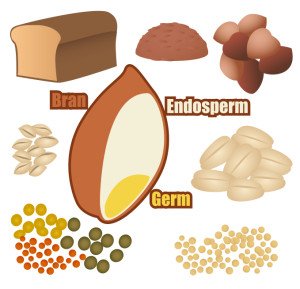The Skinny on Grains
 Carbohydrates were America’s sweetheart nutrient for nearly 30 years, but they have recently fallen out of favor with health watchers. Vilified and made the scapegoat by fad diet pushers, carbohydrates have been blamed for increasing the rates of obesity, heart disease, and a host of other ailments. As a result, grains have been pushed to the top of the “do not eat” food list.But not all grains are equal. Here’s the skinny on the difference between whole grain carbohydrates and refined grain carbohydrates.Whole GrainsCarbohydrates are the body’s main energy source and an essential nutrient for our brain. Carbohydrates are derived from grains (whole and refined), in addition to fruits and vegetables.According to the Whole Grains Council, a whole grain contains 100% of the original grain kernel, which includes the bran, germ, and endosperm. Whole grains in our diet provide us with energy, B vitamins, minerals such as zinc and iron, and fiber, which slows digestion, thus regulating our blood sugar. Therefore, it is important to consume whole grains on a daily basis.Examples of whole grains include:
Carbohydrates were America’s sweetheart nutrient for nearly 30 years, but they have recently fallen out of favor with health watchers. Vilified and made the scapegoat by fad diet pushers, carbohydrates have been blamed for increasing the rates of obesity, heart disease, and a host of other ailments. As a result, grains have been pushed to the top of the “do not eat” food list.But not all grains are equal. Here’s the skinny on the difference between whole grain carbohydrates and refined grain carbohydrates.Whole GrainsCarbohydrates are the body’s main energy source and an essential nutrient for our brain. Carbohydrates are derived from grains (whole and refined), in addition to fruits and vegetables.According to the Whole Grains Council, a whole grain contains 100% of the original grain kernel, which includes the bran, germ, and endosperm. Whole grains in our diet provide us with energy, B vitamins, minerals such as zinc and iron, and fiber, which slows digestion, thus regulating our blood sugar. Therefore, it is important to consume whole grains on a daily basis.Examples of whole grains include:
- Whole Wheat
- Oats
- Quinoa
- Brown Rice
- Barley
- Buckwheat
- Millet
Refined GrainsAny food made from a part of a grain kernel, rather than the whole kernel, is considered a refined grain. When the bran and/or germ are removed from a grain, the nutrients and fiber go with them. Some nutrients may be added back, which is referred to as “enriching” the product, but they’re never returned in their entirety. Fiber is not added back during the enrichment process.Refined grains have a higher glycemic index than their whole grain counterparts and can cause an imbalance in blood sugar, initiating swings in energy levels. To reduce these effects, refined grains should be minimized in the diet. Refined grain carbohydrates are the cause of the stir; whole grain carbohydrates are not to blame. Examples of refined grains include the following:
- White rice
- White flour
- Pasta
- Most breakfast cereals
- Most snack foods
Instead of avoiding all grains, choose whole grains more often to power you through your day.By Beth Rosen, MS, RD


